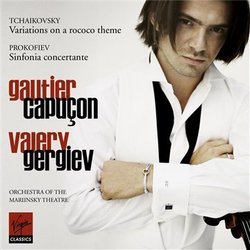Lovely playing, but the two works are minor and banal, respe
Santa Fe Listener | Santa Fe, NM USA | 02/17/2010
(3 out of 5 stars)
"Pity the poor cellist, who has only a smidgeon of popular repertoire compared to violinists. This shortage has forced star cellists to become extremely ingenious, none more so than Yo-Yo Ma. Behind the romantic cover photo of Gautier Capucon (not to mention a romantic name) we encounter two marginal residents of the cello playbook. The Tchaikovsky Rococo Variations are timid to the point of stultification -- I speak personally here -- and once past the grand statement given by Rostropovich and Karajan (on DG), is there any reason for seconds? Capucon and Gergiev go in the opposite direction with a refined, quiet, inward reading that, frankly, does the score no favors. It's all cut velvet and lace doilies. I forgot where I was ten minutes into the performance. Capucon strikes me as an elegant stylist, though, with a pure, attractive tone.
The Prokofiev Sinfonia Concertante (which also travels as the Symphony-Concerto and uses material from an earlier Cello Concerto) dates from too late in Prokofiev's career, when sickness and accident had considerably enfeebled him. Its dedicatee was a young Rostropovich, and he dug in with such passionate conviction that you could forget the work's wandering aimlessness and lack of inspiration. Capucon's elegance tends to make him not reach for extremes, even where a bit of scratching and biting would be desirable. Gergiev is the master Prokofiev interpreter of the age; Virgin's sound is impeccable; the Mariinsky Orch. has this music in their blood. If only the score had more blood itself. It barely has an idea of where it's going half the time. Forty minutes is a long time to amble about the landscape, but every sound is pleasant, so maybe that will do -- for one listen. This is Prokofiev running through familiar gestures but at a level of banality that exhausted my patience. I defy anyone to name the actual emotions being so vaguely evoked.
In short, pity the poor cellist."


 Track Listings (11) - Disc #1
Track Listings (11) - Disc #1